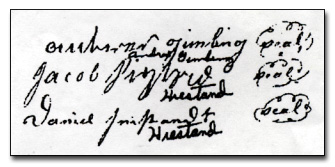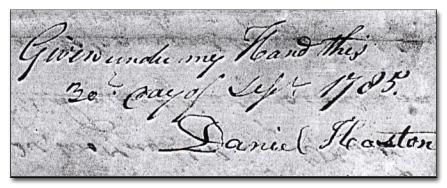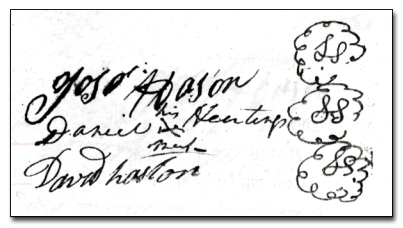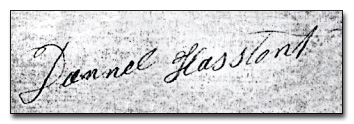|

This
signature of Daniel Hiestand, son of Swiss-German Henry Hiestand
of Page County, VA, appeared on a March 25, 1777
Dunmore County, VA estate settlement document related to
the death of Frederick Gimlin, father of Andrew Gimlin (Gimling). The surname was originally
written in a German script and then someone (perhaps a family
researcher at a later date) translated it into English.
When we compare Andrew Gimling's (brother in law to Daniel
Hiestand) signature, on this document, with another signature of his (Andrew's)
name that appeared on Henry Hiestand's will (three days
earlier), it seems clear that his (Andrew's) signature was a
bonafide self-signature and not one signed by the court clerk.
Are we to assume then that Daniel Hiestand's was also a bonafide
personal signature? Read the German script for Jacob's and
Daniel's surnames. They clearly seem to be written by
different people. This has been verified by a researcher
who reads German script. This person said that Daniel
seemed to be more as ease with his writing, which would suggest
that he was more literate than Jacob. Their (Jacob's & Daniel's) first names
may have been written by the same clerk, but it seems that the
the surname handwriting is different for their names.
Perhaps Jacob & Daniel both wrote their surnames in their
own handwriting in German, but maybe the clerk added their given
names in English. A clerk probably wrote the English
spellings of their surnames.
Source for
Daniel Hiestand signature:
Estate settlement, in Shenandoah (now Page)
County, VA, for Frederick Gimlin, father of Andrew Gimlin. The document
bears a date of March 25, 1777, which happens to be three days
after Henry Hiestand's will was created, in which Daniel
Hiestand was somewhat reprimanded by his father.
|

This signature appears on the September 1785
Revolutionary War land grant that was assigned to a Daniel Haston
at Fairfield, NC. It can and has been argued that what was purported to be a
personal "Daniel Haston" signature was actually written by
Willoughby Williams, Deputy Secretary (and son-in-law) to NC
Secretary of State, James Glasgow. Williams was the clerk who created the document. Compare this signature,
for yourself, with the handwriting of clerk Williams. The North
Carolina official, William Faircloth, who assigned this land
grant and Willoughby Williams, who wrote the "Daniel
Haston" land
grant, were both incriminated later for forging NC Revolutionary
War land grant documents in what became known as the Glasgow
Land Fraud. Willoughby was one of three men, including
James Glasgow, to be tried and convicted. William
Faircloth died before the case went to court.
Source for NC Rev War
land grant signature: NC
Secretary of State Land Grant Records, Warrants, Surveys, and
Related Documents, Tennessee County, TN, S.108.388; frames
#721-725: File #201, Thomas Archer, assignee of Daniel
Haston (Military Warrant No. 2344), 640 acres, Grant No. 1490, 4
Jan 1791. Available from the NC
State Archives, Raleigh, NC.
|

Daniel Haston signed as a security in support of his son Joseph Hasting
(Haston) in the April, 1800 Knox County, TN "timothy
lot" court case, Samuel Cowan vs Joseph Hasting.
Daniel's signature appears between those of Joseph and
David. However, notice that Daniel only provided "his
mark." The handwriting in the document seems to
indicate that Daniel's "signature" was written by the
clerk who wrote the document. Joseph's signature is
clearly distinct from the handwriting style that appears
throughout the document, as is David's. David's signature
here matches the handwriting of his (David's) signature on his
May 5, 1800 Knox County, TN marriage papers. Does this
mean that our Daniel Haston could not write his
name (in English)? If so, what does this tell us about the other
"signatures" that we have for Daniel? If he
could write in English, but he only signed with "his mark" here,
how can that be explained, especially since Joseph's and David's
signatures seem valid? The bond money that Daniel, Joseph,
and David put up was $2000 in "1800 money!"
Surely, with this amount of money at stake, a literate Daniel
Haston would not
have allowed a clerk to sign his name without him (Daniel) being
present and participating in the act. It could be
argued that Daniel was literate, but that his primary language
was German and that the Knox County court would not accept
German script.
Source for Knox County,
TN court signature: Samuel Cowan vs Joseph Haston; Knox County, TN Court Case
File: Docket # 138511235, (1800). Vol. 3 Court of Pleas &
Quarter Sessions, 1800-1802 (p. 76 / p. 100), # 1235, 1385.
Available from Knox
County, TN Archives. The 1800 David Haston marriage
bonds document is also available from the Knox County, TN
Archives.
|

In 1806, 155 men from what is now White
County, TN signed a petition to form White County from
Jackson County. This "Daniel" signature appears
on page three, the final page, of that document. This page
begins with the phrase "by his neighbours" (whoever
"his" might have been?) and is
dated July 22, 1806. Despite the "Dannel
Hasstont" spelling, it must be the name of our Daniel Haston because it appears just six
signatures down from "Joseph Haston." Also, many
of the men whose names appear on this page are men known to have
lived near Daniel Haston in that era. But is it a bonafide
personal, self-written signature of Daniel Haston?
The Isam Bradley (who was marriage
bondsman for David Haston in 1800 Knox County, TN) signature,
that appears eight places above Daniel's name, seems to match
his (Isam's) signature on David Haston's marriage papers.
However, the Joseph Haston signature on this document seems to
bear no
resemblance to Joseph's signature on the 1800 Knox County
"timothy lot" court document. Long-time Haston
researcher, Dwight Haston, who is a descendent of Joseph,
believes that Joseph still had Roane County (just west of Knox
County), TN ties at this time and that he may have gone back to
Roane County temporarily.
We can probably assume
that many, if not most, of the signatures on this list were the
actual personal signatures of the men represented.
However, interspersed throughout the list are several names that
appear to have been written by the same person who wrote other
names. It is possible that the men who were literate wrote
their own names and that the man or men who circulated the list
wrote the names for the men who could not write (in English). Perhaps
someone wrote Joseph's name because he, although a resident of
the area, was unavailable at the time. Did Daniel sign his
own name or did another man sign it for him, mistaking Haston
for Hasstont? It
seems clear that whoever wrote "Joseph Haston" was not
the same person who, just six signatures down, wrote "Dannel
Hasstont." At first glance it appears to be a
unique signature, different in handwriting style from the others
around it, but examine it for yourself. For example,
compare the capital "D's" and capital "H's"
of Daniel's signature with other names on the page.
The
harsh sounding "tont" ending for
"Hass-tont" fits
with what we know about Daniel's Swiss-German roots. The surname
probably ended with a "t" in its original form in Germany and
Switzerland--Hiestandt.
Source for
White County, TN petition signature:
Legislative Petition # 5-1-1806, Petition for the Formation of
White County from Jackson County, TN. Available from the Tennessee
State Library and Archives.
|
|
Do
you know of other Daniel Hiestend / Daniel Haston
signatures? If so, please contact
us. |
|